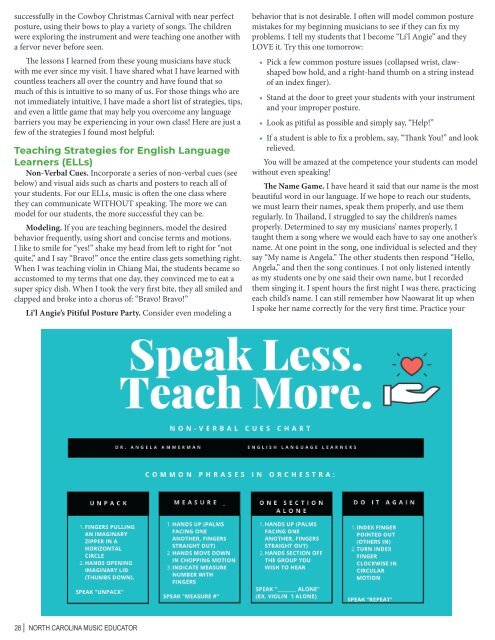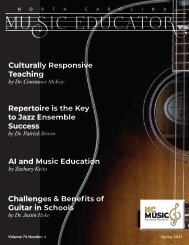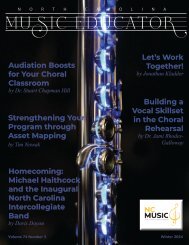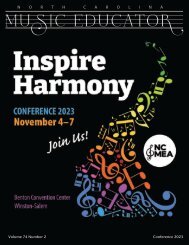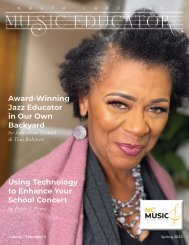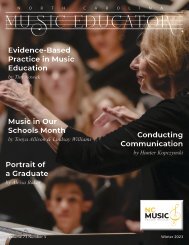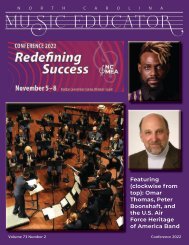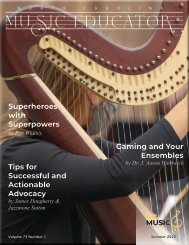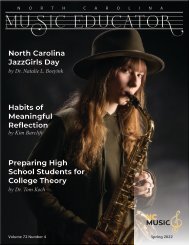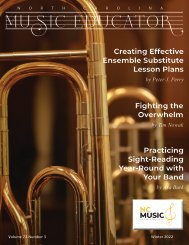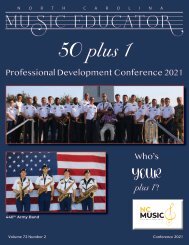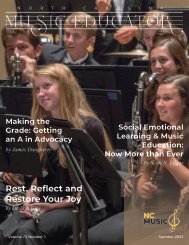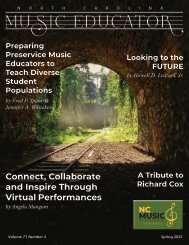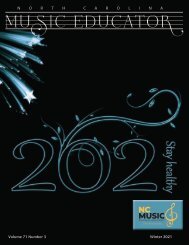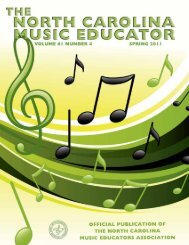Create successful ePaper yourself
Turn your PDF publications into a flip-book with our unique Google optimized e-Paper software.
successfully in the Cowboy Christmas Carnival with near perfect<br />
posture, using their bows to play a variety of songs. The children<br />
were exploring the instrument and were teaching one another with<br />
a fervor never before seen.<br />
The lessons I learned from these young musicians have stuck<br />
with me ever since my visit. I have shared what I have learned with<br />
countless teachers all over the country and have found that so<br />
much of this is intuitive to so many of us. For those things who are<br />
not immediately intuitive, I have made a short list of strategies, tips,<br />
and even a little game that may help you overcome any language<br />
barriers you may be experiencing in your own class! Here are just a<br />
few of the strategies I found most helpful:<br />
Teaching Strategies for English Language<br />
Learners (ELLs)<br />
Non-Verbal Cues. Incorporate a series of non-verbal cues (see<br />
below) and visual aids such as charts and posters to reach all of<br />
your students. For our ELLs, music is often the one class where<br />
they can communicate WITHOUT speaking. The more we can<br />
model for our students, the more successful they can be.<br />
Modeling. If you are teaching beginners, model the desired<br />
behavior frequently, using short and concise terms and motions.<br />
I like to smile for “yes!” shake my head from left to right for “not<br />
quite,” and I say “Bravo!” once the entire class gets something right.<br />
When I was teaching violin in Chiang Mai, the students became so<br />
accustomed to my terms that one day, they convinced me to eat a<br />
super spicy dish. When I took the very first bite, they all smiled and<br />
clapped and broke into a chorus of: “Bravo! Bravo!”<br />
Li’l Angie’s Pitiful Posture Party. Consider even modeling a<br />
behavior that is not desirable. I often will model common posture<br />
mistakes for my beginning musicians to see if they can fix my<br />
problems. I tell my students that I become “Li’l Angie” and they<br />
LOVE it. Try this one tomorrow:<br />
• Pick a few common posture issues (collapsed wrist, clawshaped<br />
bow hold, and a right-hand thumb on a string instead<br />
of an index finger).<br />
• Stand at the door to greet your students with your instrument<br />
and your improper posture.<br />
• Look as pitiful as possible and simply say, “Help!”<br />
• If a student is able to fix a problem, say, “Thank You!” and look<br />
relieved.<br />
You will be amazed at the competence your students can model<br />
without even speaking!<br />
The Name Game. I have heard it said that our name is the most<br />
beautiful word in our language. If we hope to reach our students,<br />
we must learn their names, speak them properly, and use them<br />
regularly. In Thailand, I struggled to say the children’s names<br />
properly. Determined to say my musicians’ names properly, I<br />
taught them a song where we would each have to say one another’s<br />
name. At one point in the song, one individual is selected and they<br />
say “My name is Angela.” The other students then respond “Hello,<br />
Angela,” and then the song continues. I not only listened intently<br />
as my students one by one said their own name, but I recorded<br />
them singing it. I spent hours the first night I was there, practicing<br />
each child’s name. I can still remember how Naowarat lit up when<br />
I spoke her name correctly for the very first time. Practice your<br />
students’ names, say them properly, say them with a smile. Our<br />
name is the most beautiful word in our language.<br />
Culturally Inclusive Programming and Planning. As you<br />
are planning future concerts, recruiting tours, and your lessons in<br />
general, consider the students in your classroom. Select literature<br />
that is relevant, enjoyable, and culturally inclusive. If you teach<br />
in an area with a large Korean population, seek out Korean<br />
composers and performers. Better yet, encourage your students<br />
to find a composer or artist their family loves. Sometimes we can<br />
find recordings of music that our students would love to play but<br />
we struggle to find an arrangement. Consider asking your more<br />
creative students if they might be interested in partnering on an<br />
arrangement of a piece that may be popular with your students.<br />
Here are a few additional suggestions:<br />
• Provide a script for your advanced ELL students to read in<br />
both English and in their native language at your next concert.<br />
• Designate one or two students to speak at your next recruiting<br />
event in their home language. I often have them simply say<br />
“We want you to join orchestra!”<br />
• Create performer heritage days where your students can bring<br />
in recordings of performers from their home country.<br />
Thanks to this project, over 30 orphans can now play the<br />
violin. As I was leaving on my last day, the children came running<br />
up with the violins as if I had forgotten essential pieces of my<br />
luggage. “No, they are yours. You keep them!” Understanding<br />
gradually came over their faces as one by one, they were flooded<br />
with relief and then joy until at last, we all came together in an<br />
enormous bittersweet hug.<br />
There is something magical about playing a musical<br />
instrument. Suddenly, the world bursts with color, confidence<br />
soars, and the impossible seems within reach. That holiday season<br />
was truly magical for the children, and for me. Before I left, one of<br />
the teachers at the children’s home said to me, “Our children never<br />
dreamed of playing the violin. They have always believed that this<br />
was an instrument for the wealthy, the privileged. Thank you for<br />
helping our children see beyond.”<br />
If you would like to learn more about the Hope House<br />
Children’s Home or feel called to donate, please visit:<br />
www.hopehousechildrenshome.com/. If you would like more<br />
information about engaging English Language Learners,<br />
check out my book, The <strong>Music</strong> Teacher’s Guide to Engaging<br />
English Language Learners, or follow me on instagram @<br />
musicteachersguide for regular tips!<br />
Angela Ammerman, referred to by the Washington Post as the first<br />
“music teacher prodigy,” is the author of The <strong>Music</strong> Teacher’s Guide<br />
Series and hostess of the podcast #<strong>Music</strong>EdLove. Dedicating much<br />
of her career to providing access to music education for underserved<br />
populations of children, she has been recognized for founding a<br />
strings program for orphaned children in Thailand. She was named the<br />
2019 Outstanding Advisor of the Year at the University of Tennessee<br />
at Martin, and the 2016 Virginia Orchestra Director of the Year.<br />
Ammerman is a frequent All-State conductor, speaker, and clinician.<br />
Ammerman has a new book coming out this summer on Recruitment<br />
and Retention and is hard at work finishing the next in The <strong>Music</strong><br />
Teacher’s Guide series on Classroom Management.<br />
NCMEA Receives CMA Foundation Grant<br />
Rural music educators face multiple challenges, even beyond<br />
those reported by their general education colleagues. The vision<br />
and opportunity of the CMA Foundation State <strong>Music</strong> Education<br />
Association Advocacy Grant is<br />
to better understand those music<br />
teachers’ obstacles and find practical<br />
solutions to their real-world problems.<br />
In the <strong>2023</strong> – 2024 school year, the<br />
State <strong>Music</strong> Education Association<br />
Advocacy Grant will support the<br />
launch of a virtual PLC for rural<br />
K – 12 teachers throughout the state<br />
of <strong>North</strong> <strong>Carolina</strong>. In the past few<br />
years, NAfME members in <strong>North</strong><br />
<strong>Carolina</strong> and the southeast have<br />
piloted smaller PLCs for rural educators, after which participants<br />
reported their desire for a longer time frame and more sustained<br />
support. NCMEA is responding by refining and expanding the<br />
project design to include both in-person and virtual connections<br />
throughout the year.<br />
One central component of the project will be an online<br />
Canvas course providing asynchronous learning from September<br />
through April. We will also host a half-day seminar for PLC<br />
members at the NCMEA Professional Development Conference<br />
in November. In the spring, teacher cohorts will arrange site visits<br />
to one another’s schools to observe and practice problem-solving<br />
in real-world settings. Participants will also be invited to meet<br />
with legislators at Arts Day in Raleigh<br />
to share the value of professional<br />
development specifically designed<br />
for rural music teachers. Finally,<br />
the culminating experience will be<br />
a statewide virtual conference for<br />
rural music educators. Participants<br />
will reflect individually on their<br />
professional development while also<br />
reporting as cohorts on their learning<br />
through PLC activities.<br />
The project will be facilitated in<br />
partnership with Dr. Daniel Johnson (UNCW), Dr. Tim Nowak<br />
(ECU), Dr. Ann Marie Stanley (LSU), and Laura Black (Rocky<br />
Point Elementary School). We hope to be able to share this<br />
hybrid PLC with other state music education organizations as<br />
a replicable model. We will begin accepting enrollment in the<br />
PLC in mid-to-late August; keep your eye on your email and the<br />
NCMEA website for more information.<br />
28 | NORTH CAROLINA MUSIC EDUCATOR NORTH CAROLINA MUSIC EDUCATOR | 29


